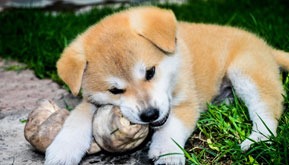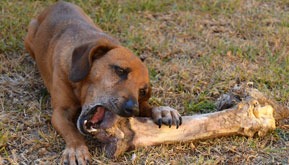It’s a familiar scene – you gave your puppy a shank bone chunk with some meat scraps, and she is happily gnawed on the meat. But she doesn’t stop when all the meat is gone. She continues chewing on the bone, biting, scraping, grinding, and crushing all that is left. She seems to enjoy it, though. But you, as the dog owner, are left thinking, “Why does a dog love a bone so much?”
The answer lies in their ancestral history. Changes in seasons greatly affect the availability of vegetables and plants which is the food for herbivores. These herbivores, in turn, are prey for carnivorous animals like wolves which are the ancestors of the domesticated dogs we have today. During dry times, plant-eaters experience food shortage because of lack of growth, causing them to be thin and lean. Therefore, meat-eating animals like wolves also experienced a shortage of quality food, as their prey becomes very lean and without fat. All that protein without fat would not provide adequate nutrition they needed to keep from being thin and weak themselves. The last source of fat in an animal lacking proper nutrition is in the bones, especially the bone marrow that is particularly rich in fat.

The best way to benefit your dog is to make sure they get a raw bone. Boiled bones are fine – this makes the bones softer. Smoked bones are OK too because it also softens the bones a bit and makes them tastier. The key is to make sure the bones are raw or just lightly cooked, and never give your dog a fully cooked bone. Fully cooked bones have their fat in the bone marrow melted away with the dish, leaving little of nutritional value for your dog. Cooking also makes bones brittle and prone to splintering, making them potentially harmful to your dog’s digestive system.

You can consider also grinding the bones which will help your dog absorb these minerals more easily and digest the bones. You can grind the bones in a heavy-duty grinder or food processor. You also have to make sure that you avoid splinter bones and other small pieces to prevent clogging up your machine. But in some ways, the grinding takes away the fun for your dog.
You should still consider whole raw bones. Here are some other advantages, besides nutritional benefits:
Eases teething and other dental benefits
When puppies chew on bones, it stimulates the growth of teeth and prevents discomfort during teething. Chewing on hard stuff like bones helps relieves pain caused by new teeth pushing through the gums. Meanwhile, when dogs chew on bones, it stimulates their jaw. All that chewing and gnawing could serve as an exercise for their jaw muscles. The scraping of bone against teeth also helps remove plaque from the teeth, preventing the buildup of tartar and yellowing of teeth.
Relieves boredom
Like humans, pets get bored too. Chewing on a bone would entertain them and keep their minds stimulated, especially for more inactive dogs or when they are left at home when you go to work. You can also keep them occupied with bones so that you won’t be disrupted by their begging when you’re having your family dinner. It can also help to keep them from doing mischievous things while you are away.
Pleasure
Dogs have a natural urge to chew. If they are biting and scratching your furniture, or are ruining your shoes, give your dog a bone. For them, bone chewing releases endorphins, the “feel good” hormones. Make them feel good by doing something enjoyable for them and non-destructive for you.

